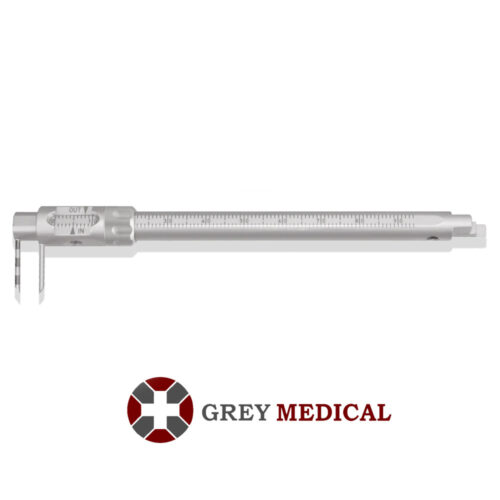Sliding Caliper: A Precision Instrument for Measurement in Surgical and Industrial Applications
Sliding Caliper: A Precision Instrument for Measurement in Surgical and Industrial Applications
Blog Article
The sliding caliper is a highly versatile precision instrument used for measuring distances, depths, and diameters with exceptional accuracy. In surgical, dental, and industrial applications, sliding calipers play a crucial role in ensuring precision, whether it’s during procedures, manufacturing, or quality control. sliding caliper designed for accuracy, durability, and ease of use, sliding calipers are indispensable tools in a variety of fields.

Design and Features
The sliding caliper consists of several key components, which contribute to its accuracy and functionality. Its design allows for precise measurements in both linear and dimensional aspects.
- Sliding Mechanism:
- The caliper features a movable jaw that slides along a fixed scale or beam. This allows for precise adjustments to measure objects of varying sizes.
- Measurement Scales:
- Sliding calipers come with metric and imperial scales (or both) engraved on the beam for direct readings. In digital models, measurements are displayed on an electronic screen for added convenience.
- Jaws:
- The caliper has two sets of jaws: external jaws for measuring outer dimensions (e.g., width, diameter) and internal jaws for measuring inner dimensions (e.g., cavities, bores).
- Depth Probe:
- A slender depth probe extends from the base of the caliper to measure the depth of holes or recesses.
- Locking Screw:
- The locking screw allows the user to fix the movable jaw in place once the desired measurement is achieved, ensuring stability and repeatability.
- Material:
- Sliding calipers are typically made from stainless steel or other durable materials, providing resistance to corrosion and wear.
- Digital and Manual Options:
- Sliding calipers are available in both manual (vernier scale) and digital models. Digital calipers provide faster readings with less room for error.
Applications in Surgical and Medical Settings
Sliding calipers are widely used in medical and surgical contexts to measure anatomical structures, prosthetics, and implants with precision. Common applications include:
- Dental and Orthodontic Procedures:
- Used to measure teeth, jaw dimensions, and spacing for the placement of braces, crowns, or implants.
- Accurate measurement of dental models and impressions.
- Surgical Implant Measurements:
- Ensures precise sizing of orthopedic or dental implants before placement.
- Measures bone gaps or distances during joint replacement or fracture fixation procedures.
- Plastic and Reconstructive Surgery:
- Sliding calipers are used to measure soft tissues or bone for aesthetic and reconstructive procedures, ensuring symmetrical results.
- Craniofacial and Maxillofacial Surgery:
- Measures craniofacial structures to aid in surgical planning for corrective or reconstructive surgeries.
- Histology and Pathology:
- Sliding calipers are used to measure tissue samples, ensuring consistent dimensions for microscopic examination.
Applications in Industrial and Engineering Fields
Sliding calipers are equally vital in industrial and engineering settings, providing precise measurements for various manufacturing and quality control tasks.
- Machining and Manufacturing:
- Measures dimensions of machined components, ensuring they meet specified tolerances.
- Quality Control:
- Used to verify the accuracy of parts and assemblies in industrial production.
- Metalworking and Toolmaking:
- Measures external, internal, and depth dimensions of tools and molds.
- Automotive Industry:
- Ensures precise measurement of engine components, shafts, and bearings.
Advantages of Sliding Calipers
Sliding calipers offer a wide range of benefits, making them a preferred tool for precise measurements:
- High Accuracy:
- Provides accurate readings, often within a fraction of a millimeter or inch, depending on the model.
- Versatility:
- Measures external, internal, and depth dimensions with a single instrument.
- Ease of Use:
- Simple design and user-friendly operation make calipers accessible to professionals and novices alike.
- Durability:
- Made from high-quality materials, sliding calipers are built to withstand rigorous use in both medical and industrial settings.
- Portable:
- Lightweight and compact, sliding calipers are easy to transport and store.
Care and Maintenance
To ensure the longevity and accuracy of a sliding caliper, proper care and maintenance are essential:
- Cleaning:
- After each use, clean the caliper with a soft cloth to remove dust, debris, or biological material in medical applications.
- Calibration:
- Regular calibration is necessary to maintain the instrument's accuracy, particularly in professional and industrial settings.
- Storage:
- Store the caliper in a protective case to prevent damage to the scale, jaws, or electronics (for digital models).
- Avoid Overuse:
- Do not apply excessive force when using the caliper to avoid damaging the sliding mechanism or jaws.
- Protect Electronics:
- For digital calipers, avoid exposure to water or extreme temperatures to protect the electronic components.
User Feedback and Reviews
Professionals across various fields frequently praise sliding calipers for their precision, reliability, and ease of use. Digital models, in particular, are valued for their quick readings and ability to switch between metric and imperial units. In surgical and dental applications, the compact design and versatility of sliding calipers make them an indispensable tool for achieving accurate measurements.
However, users also highlight the importance of regular calibration and proper maintenance to preserve the instrument's performance over time.
Conclusion
The sliding caliper is a versatile and essential precision instrument, offering accurate measurements for surgical, medical, and industrial applications. Its ability to measure external, internal, and depth dimensions with ease makes it an invaluable tool across diverse professional fields. With proper care, calibration, and maintenance, sliding calipers continue to be a reliable and effective instrument for achieving high levels of accuracy and precision. Whether in the operating room, dental clinic, or manufacturing floor, the sliding caliper remains a cornerstone of measurement tools. Report this page